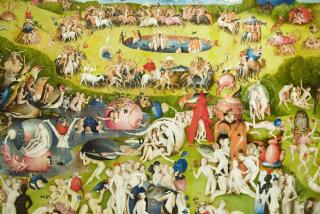Jeff Vandermeer’s new dystopian novel ‘Borne’ is lyrical and harrowing; Elizabeth Hand reviews
- Share via
“Borne,” Jeff Vandermeer’s lyrical and harrowing new novel, may be the most beautifully written, and believable, post-apocalyptic tale in recent memory: A considerable achievement, considering “Borne” features not just a near-future, nameless city; an enormous, sentient, cataclysmically destructive bioengineered bear; and the endearing intelligent cephalopod who gives the book its title. “Borne’s” narrator, Rachel, discovers the strange creature while scavenging within the city:
“ …a hybrid of sea anemone and squid: a sleek vase with rippling colors that strayed from purple toward deep blues and greens. Four vertical ridges slid up the sides of its warm and pulsating skin. The texture was as smooth as waterworn stone, if a bit rubbery. It smelled of beach reeds on lazy summer afternoons and, beneath the sea salt, of passionflowers. Much later, I realized it would have smelled different to someone else, might even have appeared in a different form.”
Rachel has come across the creature not on a sandy shore but tangled in the filthy fur of Mord, the immense bear who stalks the city like a deranged, mammalian Godzilla. Over three stories tall (and growing), Mord is a failed product of the sinister biotech corporation known only as the Company, whose wrecked headquarters dominate the city’s southern horizon. Along with myriad other scavengers, Rachel both fears and depends on Mord’s ceaseless depredations. He devours humans with malign pleasure, but his systematic destruction of their dwellings means he’s constantly exposing new layers of the city’s past, revealing new sources of food, supplies and housing.
And when Mord sleeps, scavengers like Rachel climb his dormant form as though it were a trash mountain, seeking remnants of biotech, buildings, clothing, human remains — anything she can share with her lover Wink, a former Company employee, now a drug dealer kept alive by biotech medication. Wink, a melancholy, wraithlike figure not so much haunted by his Company past as possessed by it, manipulates Rachel’s scavenged materials to create his biotech drug product: beetles that, when they burrow into your ear, allow you to “experience someone else’s happier memories from long ago, from places that didn’t exist anymore.”
Rachel is from one of those places, an island country engulfed by rising sea levels. She, her politician father and physician mother escaped on a refugee ship when Rachel was 6. For years they fled one country for another. Sometimes her parents found work for a year or two, and Rachel attended a makeshift school. Sometimes they were interned in refugee camps. Sometimes they walked vast distances in hope of finding new refuge.
Six years before the novel takes place, Rachel herself arrived in the city. She now remembers some things about her past but not others. Her parents’ fate; how she found herself in the nameless city; what disaster engulfed that city and, seemingly, the world beyond — all these things belong to what Rachel has lost. She squats with Wick in the Balcony Cliffs, a vast ruin riddled with boobytraps she’s designed to keep out other scavengers and the roaming hordes of Mord’s smaller but equally deadly ursine proxies. This is where she brings her squid-like find. She names it Borne, in homage to one of the few memories Wick has shared of his time at the Company as a biotech designer: “He was born, but I had borne him.”
Vandermeer, whose many works of fantastika include the bestselling Southern Reach trilogy, outdoes himself in this visionary novel...
Initially, Borne seems “as harmless and functional as a lamp,” and as inert. Rachel talks to it the way one might talk to a plant. But then Borne begins to grow, feeding on lizards and insects like a terrestrial sea anemone. Rachel upgrades her impression of Borne from vegetable to animal when she realizes the creature creeps around when she’s not there, eating compost worms and whatever hapless creatures it can find.
Borne, at first an “it,” now becomes “him.” Wick initially views him with detachment. Rachel, however, becomes increasingly fascinated, even obsessed by, what she believes is Borne’s developing personality, and also his strange metabolism. Despite ingesting myriad animals and objects, organic or inorganic, Borne never seems to excrete anything. Within a month, he’s tripled in size.
And, after Rachel is viciously attacked by a pack of genetically altered, monstrous children dispatched by a rival drug lord, Borne begins to speak, but only to her.
His relationship with Rachel grows filial: She loves him as a child, even as Wick grows more fearful of what Borne might actually be. Fueled by Rachel’s accounts of what she recalls of her earlier life, Borne’s intelligence explodes. He develops shape-shifting abilities. His childlike curiosity burgeons into an adolescent’s need for experimentation and, finally, independence. Several months after Rachel rescues him from Mord’s matted fur, Borne leaves the relative safety of the Balcony Cliffs, and engages in an act of betrayal that will change the city and its denizens as irreparably as Borne himself has changed.
Vandermeer, whose many works of fantastika include the bestselling Southern Reach trilogy, outdoes himself in this visionary novel shimmering with as much inventiveness and deliriously unlikely, post-human optimism as Borne himself. With his wife Ann, Vandermeer has edited numerous anthologies of fantasy and science fiction, sampling centuries of global literature. His love for that literature glows from every page of “Borne,” a novel dense with literary touchstones: Samuel R. Delany’s “Dhalgren”; China Mieville’s New Crobuzon series; Lucius Shepard’s Dragon Graiule tales; Mary Shelley’s “Frankenstein”; Paul Park’s Starbridge Chronicles and M. John Harrison’s Viriconium sequence; the movies “Blade Runner” and “Under the Skin.” The chapters where Rachel recalls what she can of her past have the subdued power of Ishiguro’s work.
Despite its blasted setting, “Borne” is startlingly alive, with creatures natural or bioengineered: owls and foxes, salamanders and lizards, memory beetles and minnows that dissolve on the tongue in a cloud of alcohol, miniature nautiluses and segmented worms that keep Wick alive.
At times, the sheer beauty of Vandermeer’s prose, and the complex world it invokes, overwhelm the plot. Wick’s foil, the drug lord known as the Magician, never develops enough of a presence to feel truly threatening. The poisonous rains and packs of marauding, monstrous children make a few ominous appearances then recede into the background like stage props. Occasionally, the tight focus of Rachel’s narrative, centered on herself and Wick, makes the Piranesian city seem to shrink, like one of Wick’s bits of biotech when it’s deprived of water. And, as with Pinocchio and Jean Cocteau’s Beast, Borne loses some of his magic as he grows more human.
But then Mord wakes to stomp across the city, a skyscraper-sized, nightmare vision of the grizzly from “The Revenant,” or a group of glimmering foxes scamper across the distant ruins like emissaries from a Miyazaki film; and Vandermeer’s invented universe rises once more. “What was the word for raising an orphaned intelligent creature?” Rachel wonders of Borne. “Are you a person or a weapon?” In “Borne,” Jeff Vandermeer has created a world where questions like this are asked. In doing so, he reminds us that our own world may soon be providing us with answers we don’t want to hear.
Elizabeth Hand’s most recent book is “Fire,” a collection of essays, stories, and criticism.
“Borne”
by Jeff Vandermeer
MCD: 336 pp., $26
More to Read
Sign up for our Book Club newsletter
Get the latest news, events and more from the Los Angeles Times Book Club, and help us get L.A. reading and talking.
You may occasionally receive promotional content from the Los Angeles Times.






